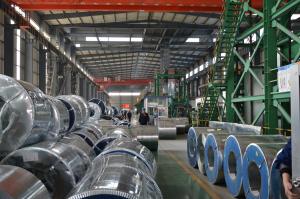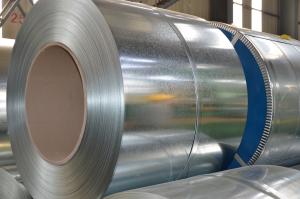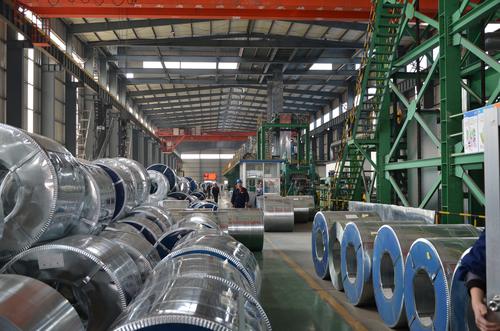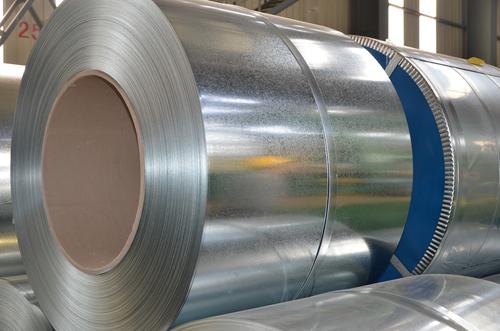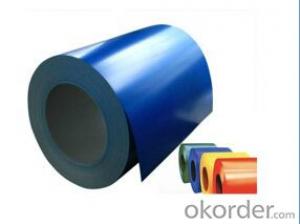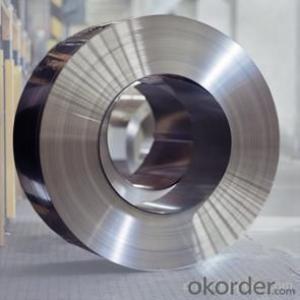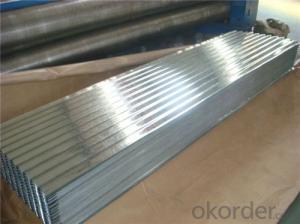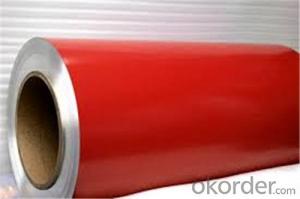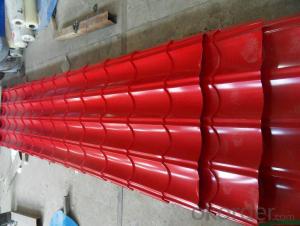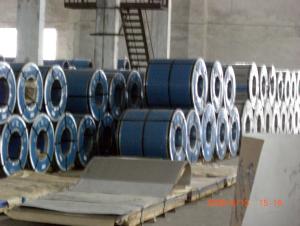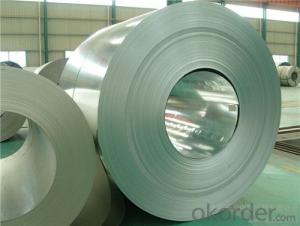galvanized steel coils
- Loading Port:
- China Main Port
- Payment Terms:
- TT OR LC
- Min Order Qty:
- -
- Supply Capability:
- -
OKorder Service Pledge
OKorder Financial Service
You Might Also Like
1) Quality Standard & Grade: JIS G3302, SGCC / ASTM 653M CQ/ EN10142 DX51D+Z
2) Thikness tolerance: +/-0.02mm Width tolerance:+/0.02mm
3) Zinc coating weight: 50g/m2
4) WEIGHT OF PER COIL: 3-5MT
5)Technology: cold rolled
6) Surface of Product: regular spangle / big spangle/ small spangle; Surface Treatment: chromated , non oiled, skin passed
7) Packing: export standard packing,packed with moisture resistant paper and metal
wrapping,securely tied for export,on metal skids7) Country of Origin :
SIZE:0.19*750
- Q: How are steel coils used in the manufacturing of electrical transformers?
- Steel coils are used in the manufacturing of electrical transformers as they provide structural support and act as a core for the transformer. The steel coils are wound with copper wire to create the primary and secondary windings, which help in transferring electrical energy efficiently.
- Q: i have a question on a test and the questions before it are about blast furnace, wrought iron and cast iron...question 16 is..What is Steel?i dont really get what im being asked.. there could be many answers, what answer are they looking for?
- steel is a mixture of two or more metal or a metal with non metal to obtain both properties of the indivudual components. carbon steel for example.
- Q: did bible stated that steel is coming from outer space. i mean meteor rocks that enter our earth sistem contains the minerals iron.
- Steel is not elemental, if that's what you mean. It's a metal alloy, a combination of mostly iron and some carbon. Iron and carbon both occur naturally on the Earth, but you have to melt them together to make steel.
- Q: I'm looking for a steel plate for an design project that requires neodymium magnets to be stuck on them. I am trying to figure out what kind of steel plate would have hold the magnets up the best.
- Magnet
- Q: Building the bulwurk, general use on trawlers. What kind of steel is best suited.
- How big is your trawler going to be and what use, The ones you see off the Alaska Coast or a Gulf Coast Shrimper? My preference in today's economy would not make sense and that is Aluminum.....not steel at all, maybe even Fiberglass, but $$$$ talk so Steel is cheaper, but you need to know what you are doing. The designer of the hull should have specified the right /preferred grade. It today's world there are many more choices available. You use a mild steel, most often grade A or B, but some applications call for grade D. Check your blue prints and list of materials. Edit. Ok I understand. There are 2 ways to go. One is use a relatively cheep steel and use higher cost epoxy primers and paint, often requiring special surface preparation just before priming, or two, using a much higher cost steel with more chrome and nickel in it. Grades that begin with #3xxx These are weldable with rods that are available, and can be welded directly to mild steels. However these are 3X the cost. If your a Shrimper, I'm guessing gulf coast. I worked with several boat yards in the 70's installing spray urethane foam for insulating there holes. So I've been around lots of small yards from Florida to Texas. I'd call the nearest steel warehouse and ask what they would recommend. You might find what you want at a scrap yard. I've lucked out several times picking up 1/4 plate scrap$ and I'd bet the scrapyard guy would know just what you need. I know there are places to get what you need in Mobile and New Orleans. Good luck!
- Q: What are the common uses of pre-painted steel coils?
- Pre-painted steel coils are commonly used in various industries such as construction, automotive, and appliance manufacturing. They are used for roofing and siding applications, as well as for making durable and aesthetically pleasing metal doors, window frames, and garage doors. Additionally, pre-painted steel coils are utilized in the production of electrical enclosures, air conditioning systems, and various other metal components that require corrosion resistance and a visually appealing finish.
- Q: How are steel coils used in the manufacturing of conveyor belts?
- Steel coils are used in the manufacturing of conveyor belts as they provide strength, durability, and flexibility to withstand the heavy loads and continuous movement experienced in conveyor systems. The coils are shaped into a continuous loop, forming the core structure of the belt, which is then covered with various materials to enhance grip, prevent slipping, and improve overall performance.
- Q: Why is the steel tape tape head not fixed?
- There are better tape measures, heads and magnets. For measuring steel objects, one can operate long distances.
- Q: How are steel coils protected from humidity?
- Steel coils are typically protected from humidity through a process called galvanization, where a layer of zinc or another protective coating is applied to the surface of the steel. This coating acts as a barrier, preventing moisture from coming into direct contact with the steel and minimizing the risk of corrosion. Additionally, steel coils are often stored in dry, enclosed spaces or wrapped with moisture-resistant materials such as plastic or wax paper to further protect them from humidity.
- Q: I wrote in my assignment that mild steel has a high carbon content (4%).This is why it has its strong and rigid properties.. is this correct?
- Bazza is heading in the right route yet time fogs the remember for us all. cut back small try samples off the inventory bar say pound coin thickness. warmth cherry purple and quick quench in water. The intense carbon metallic will be hardened so puzzling to scratch even as gentle scratches genuinely utilising a drill element or hacksaw blade. That warmth treatment will go away the metallic in its toughest maximum brittle state so will carry an edge yet snap like a carrot. So having hardened your merchandise it can be tempered to get rid of a few hardness and presented toughness. So the compromise is difficult adequate to carry the edge yet difficult adequate to deflect sensibly without fracture. Swot up on mood colors/warmth treatment and practice on scrap. an exciting litte exercising i have used with apprentices contained in the previous is to take an old document and anneal (melt) it so it drills or takes a said cut back genuinely then re harden it so it files back. The tang will be got here upon harder than the blade though it is the same metallic. note the tang will be bent without snapping. For practice you are able to harden the tang so it snaps common. in simple terms by how scrap chilly chisels, drill bits, files etc are in simple terms the metallic you want and recycleable by forging and warm temperature teatment. i think a Samurai second drawing close!!!!! sturdy success
Send your message to us
galvanized steel coils
- Loading Port:
- China Main Port
- Payment Terms:
- TT OR LC
- Min Order Qty:
- -
- Supply Capability:
- -
OKorder Service Pledge
OKorder Financial Service
Similar products
Hot products
Hot Searches
Related keywords
